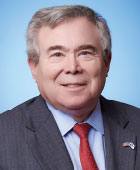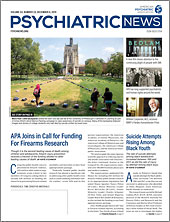This year’s IPS: The Mental Health Services Conference (IPS) was held October 3 to 6 in New York City. The IPS has suffered from poor attendance for several years despite the high quality of the program and its focus on community psychiatry, which serves some of our most vulnerable patients. APA has had to heavily subsidize the meeting out of its reserves. Nonetheless, many of us are committed to this meeting and want to see it thrive once again. To accomplish that goal, since no meeting was scheduled for 2020, the Board of Trustees decided to use the time to study and implement a redesign that would make the IPS more successful.
My objective for this year’s IPS was to open and advertise this meeting to the full range of mental health professionals who help care for patients in community settings, especially those with serious mental illness. Anyone who works at a community clinic or a major medical center knows that our day-to-day colleagues are psychologists, social workers, nurse practitioners, and, increasingly, peer counselors. Under the leadership of Drs. Eric Yarbrough and Robert Cotes, we may have found a potentially successful formula to help this meeting thrive.
As a start, we added a nurse practitioner to the IPS Scientific Program Committee. I contacted universities in the New York City area with psychiatric nurse practitioner programs and invited them to submit an abstract for one of my Presidential Sessions. Staff in APA’s Department of Integrated Marketing reached out to the social work and psychology communities. Three directors of psychiatric nurse practitioner programs in the New York area responded to my invitation. Their session was titled “The Role of Interdisciplinary Collaboration in the Evolving Health Care System: Past, Present, and Future,” and I served as discussant. The three directors represented the programs at New York University, Columbia University, and the State University of New York at Stony Brook. I learned much from their presentations, including how their profession has evolved, the problems faced by their discipline, and the strengths and skills they bring to the care of their patients.
It was clear from their complaints that they are trying to cope with many of the same issues as psychiatrists in our current system of care. Specifically, graduates of the programs represented at the IPS are expected to see very high volumes of patients. Clinic directors want them to be prescription writers only, despite their wanting to take a more psychologically holistic approach to patient care. Most of the graduates from these programs are trained in several psychotherapy modalities. They know as well as any psychiatrist that patients require psychological treatment, and just giving a pill does not constitute adequate care. Despite the graduates’ comprehensive training, they are usually given workloads that prevent them from providing these treatments. Sounds like conversations we all hear from just about every psychiatrist who works in these settings as well.
These poor clinical practices are driven by inadequate and discriminatory compensation for psychiatric treatment. The pressure on treatment programs to remain solvent requires high volumes of visits, a problem compounded by the severe shortage of psychiatrists to meet the immense demand for mental health services. It is estimated that over 5,000 psychiatrists are required today to address just the needs of federally designated mental health care professional shortage areas.
The program directors who presented at the IPS reported another major complaint from their graduates: There are usually no psychiatrists or senior nurse practitioners to supervise and to consult with them. They want access to skilled psychiatrists but are rarely afforded that opportunity.
How did our strategy work to broaden the attendance at the New York meeting? There was a 33% increase in total professional attendance over the 2018 meeting in Chicago, evenly attributable to APA members and nonmembers. We also benefitted from the pre-meeting symposium on early psychosis, which attracted multidisciplinary attendees, and co-sponsorship by the World Psychiatric Association.
My vision for the IPS is to become the forum for all who work in community psychiatry settings to learn together, share best practices, and foster collaboration and collegiality. As your president, I believe this is one of the best ways in which APA can demonstrate its leadership and make this vision a reality. ■

